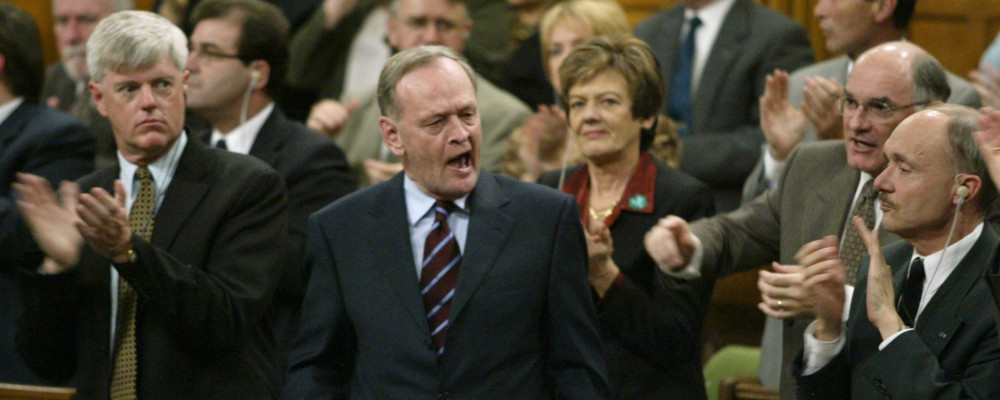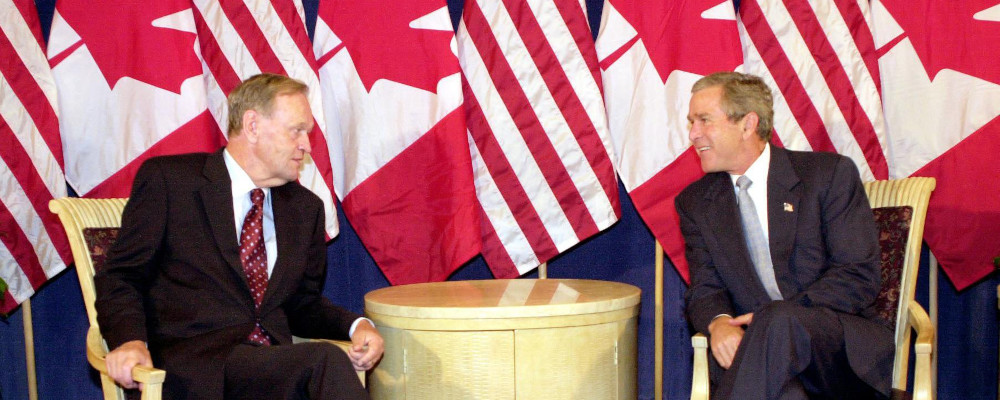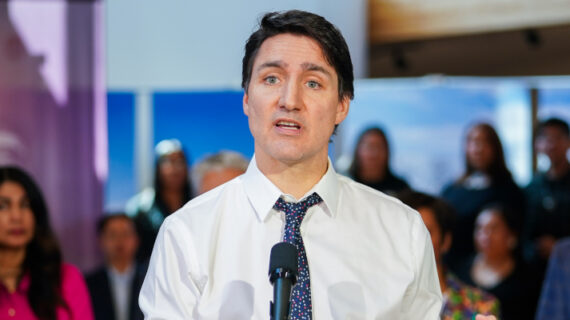The Hub is pleased to present a weekly column from author and historian Antony Anderson on the week that was in Canadian history.
March 17, 2003: PM Jean Chrétien announces Canada will not participate in the American-led invasion of Iraq
Perhaps this is our true superpower: just saying “No.”
In September 2001, confronted by murderous attacks on American soil, U.S. President George W. Bush put the world on notice, “Every nation, in every region, now has a decision to make. Either you are with us, or you are with the terrorists.” When Washington took on the religious extremists in Afghanistan dedicated to killing infidels—that would be us—Prime Minister Jean Chrétien dispatched Canadian ground forces to join the fight, Canada’s first combat role since the 1950 Korean War. It soon turned out to be just the opening round. Next came the battle over Iraq, at first conducted amongst friends in secret diplomatic cables, official statements, and personal encounters. Iraqi president, Saddam Hussein, was said by high-ranking U.S. officials to possess the makings of weapons of mass destruction. Better to take him out sooner rather than later, their arguments went.

Chrétien was unconvinced by the legality and morality of the case and by the complacent presumptions of success but he remained open. His public and private response was clear and consistent—Canada would participate in this next phase if the U.N. Security Council authorised the mission, a classic Canadian position going back to Korea and very much behind our participation in the 1991 Gulf War. Some allies—most notably Britain’s Tony Blair—clamoured to get to the front of the line. Many held back with Canada. Students and practitioners of international relations made compelling cases for opposing arguments. The looming assault on a dictatorship was justified because individual human security mattered more than national sovereignty, while others insisted one must respect the sanctity of international boundaries no matter what evil lurked within. Merely standing still in this hurricane required formidable confidence and discipline.
Such was the intensity of the times that Bush offered to come to Ottawa himself. Chrétien dodged the invitation, noting to his foreign affairs minister Bill Graham, “I can say no to Bush on the phone. It would be harder to say no to him face to face.” At another point in the diplomatic contortions, Graham, a former professor of law, mused with his boss about whether Canada would have more influence in the matter if it held a seat on the Security Council. A shrewd political veteran, Chrétien replied, “Bill, there are times when you don’t want to be on the Security Council.” And besides, beyond the U.N., there were multiple other arenas to put the squeeze on Canada. At the 2002 Commonwealth gathering in South Africa, Blair met with Chrétien over a private drink to make the case for getting rid of the “ruthless tyrant.” In his memoirs, the Canadian leader recalled posing a relevant question: if we take out one nasty leader—and no one disputed the loathsome depravity of Hussein—where do we stop? Do we cross the border into Zimbabwe, Chrétien asked, and remove the appalling Robert Mugabe? Blair tried to counter by saying there was a difference between the two leaders but Chrétien cut him off with the apparently infuriating observation, “Tony, there is indeed a tremendous difference. Mugabe has no oil.” Fair point but not the whole story.
Washington would not be deflected forever and in February 2003 dispatched its chief diplomat, a former general no less, Secretary of State Colin Powell, to unveil seemingly detailed evidence at the Security Council outlining Iraqi transgressions and threats. He could not persuade key holdouts like France and Russia and much later, apparently confided to Graham, “You have no idea. I threw out boxes and boxes of stuff they tried to get me to say. I was briefed by our intelligence people with mountains of crap. That’s what I got.” Well, the crap certainly didn’t smell like champagne and Canada continued to stand back while other democracies, including Denmark, Japan, the Netherlands, Poland, and South Korea agreed to go into Iraq and topple a murderous tyrant, whether the U.N. gave its blessing or not. To newspapers and their pundits, political parties, and think tanks operating on what is called the right wing, Chrétien’s waiting game was outrageous if not treasonous. But he was in fact following a time-honoured Canadian trajectory when dealing with empires that echoed back to Sir John A. Macdonald.
Despite proud declarations about remaining a British subject from birth to death, Macdonald refused the Mother Country’s call in 1885 to sail to Sudan to put down a religious fanatic, “Why should we waste money and men in this wretched business…sacrificed to get [U.K. PM] Gladstone and Co. out of the hole they have plunged themselves into by their own imbecility.” Sir Wilfrid Laurier refused to join the Empire’s campaign to bash the Boers in South Africa, explaining in the House of Commons in February 1900, “While every Canadian admits that he would be ready to contribute our treasure and our blood…for the rescue of England, were she engaged in a life and death struggle, there are many Canadians who are not ready to take part in the secondary wars of England.” In 1922, William Lyon Mackenzie King declined the imperial summons to defend a British garrison in Chanak, Turkey, noting in his diary, “How quickly a nation may become inflamed and the war passions aroused. Indeed everyone seemingly is ready for war—nurses, soldiers, churches…there is no attempt to consider the issue, just that Britain has issued a call, therefore we should respond.” Louis St. Laurent would defy the British appeal to help out at Suez in 1956. In the 1960s, Lester Pearson would evade American invitations to send troops to Vietnam. So there were precedents, touchstones, continuities.

By the spring of 2003, the disunited Security Council failed to agree on how it should deal with Iraq. Washington wasn’t waiting around for any more polished debates. It was going in. On March 17, Chrétien stood in the House of Commons and declared, “A year ago, I said to the president of the United States that Canada would intervene in a conflict with Iraq only if we were to have a resolution authorizing intervention by the Security Council. They have known my position and the position of the government since the first day. We have always stuck with that position. Today we have the conclusion that the Security Council does not have a resolution to authorize action, so we are not participating.”
Some fretted about American retaliation but, as is often the case, the cross-border relationship is so vast and entangled it’s not easy for them to hurt us without inflicting damage upon themselves as well. And in the end, the ties that bind are not just a cold-blooded counting of goods bought and sold. They’re emotional as well. They cut us slack. It helped that, even though he denied the big ask, Chrétien kept Canada in the wider war in other ways, on the very deadly ground in Afghanistan and in the Persian Gulf serving in a multi-national naval task force—not unlike how Macdonald and Laurier refused to send official contingents but still allowed volunteers to sail to their dreamed of adventures over the horizon.
Ultimately, time proved Chrétien right. Any hallucinations held in the Oval Office and State Department of imposing democracy were engulfed by the unforgiving reality of making peace with people whose lives and homes had been devastated by American shock and awe, even more so in a region that defies the best of outside intentions and foolish meddling.
This was a big moment, and perhaps the decision that Chrétien will be remembered for most. Macdonald, Laurier, King, St. Laurent, and Pearson would have voiced their approval. Future prime ministers will need to study the footwork.




